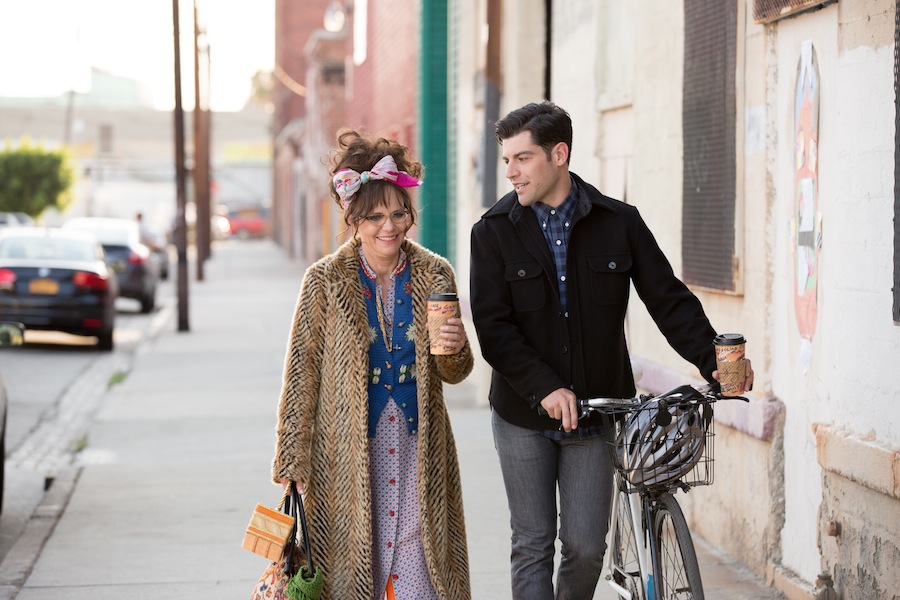‘Hello My Name is Doris’ As Doris, a Staten Island cat lady in love with a 20-something go-getter with a 1000-watt smile (Max Greenfield), Sally Field isn’t just a lovable caterpillar belatedly and heroically becoming a butterfly. She can be, by turns, weird, delusional, creepy. She can make things, and the movie built around her, awkward and uncomfortable. It’s not the Sally Field we expect, and though there are plenty of reasons to empathize with her blinkered protagonist, her fiercely committed turn doesn’t sand down the rough edges. Doris is someone so desperate for an unlikely dream that she refuses to take hints and doesn’t think twice about turning into a stalker and, at one point, a destructive force. RELATED: Interview: Reggie Watts on “Creative Control” and the “underdog” “Late Late Show” “Hello My Name is Doris” has to walk a particularly thin tightrope. Make its hero too sweet and the film falls into a vat of bathos. Make her too out-there and it becomes simply cruel. If it falls at all, it’s usually on the former side, though it always gets back up. It starts off wholly on her side: Doris’ mother, with whom she gave up her life thus far to take care of, has just died. She still lives in their packrat suburban home, working the same nondescript (albeit at least Manhattan-located) job she has for years. Doris deserves a change of habit, and she gets one in the form of Greenfield’s John. He’s the company’s hotcha new art director, who not only doesn’t seem to mind her mega-nervousness but finds it endearing. Outgoing and a little oblivious himself, he makes friends with her, unable or unwilling to see that his new bestie thinks their relationship is of the ambiguous kind. Empowered by reckless motivational tapes (starring king of smirking bad movie advice, Peter Gallagher), she tries to worm her way into his heart, even that means creating a fake Facebook account and sabotaging his “age-appropriate” romances. RELATED: Interview: Jonathan Gold on “City of Gold,” Los Angeles, gentrification and one food he dislikes Director-cowriter Michael Showalter can make some of her plights too tidy and indie-friendly. There’s a hissable brother (Stephen Root), who’s trying to get her to move from the family home so he can sell it. Even there Showalter’s open to the idea that our lead character is intransigent and unwell, but still a figure of genuine pathos. It even entertains the notion that Doris and John could be an item — that the dealbreaker isn’t the age gap so much as her hyper-neediness and occasional lack of ethical graces. (Greenfield’s work is also worth commending. He makes John strapping and exuberant and ambitious, but also kind and warm, almost an old soul. He makes his friendship with her not just a fantasy.) Doris is a useful main character to have, as she’s someone that encourages condescension: the damaged type swept under the rug by society and movies, whose actions, when they’re noticed at all, tend to be written off as cute. At one point her dorky hermit clothes are interpreted by younger characters as a hip fashion statement. She’s seen by other characters as harmless and adorbs, but no one’s interested in getting to really know her, thus seeing the real desperation and trauma and darkness lurking just underneath the surface of big granny glasses and spluttering social interactions. (Meanwhile, her actual best friend, played by a surly and scene-stealing Tyne Daly, is partly invested in her because of their shared loneliness.) The movie knows the real her, though, and right up until its ending it knows that she’s someone who lives in a fantasy world. For her, even a happy ending will have to exist partly in her head.
Director: Michael Showalter
Stars: Sally Field, Max Greenfield
Rating: R
3 (out of 5) Globes
‘Hello My Name is Doris’ isn’t afraid to let Sally Field go creepy

Roadside Attractions
Follow Matt Prigge on Twitter @mattprigge

















